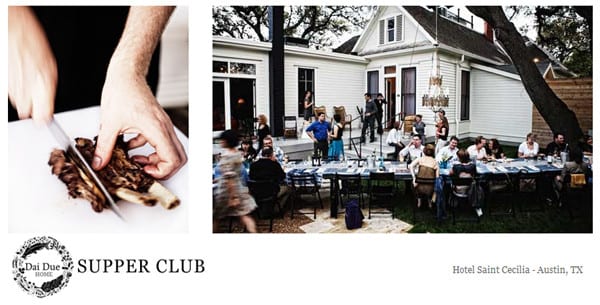
The ever increasing popularity of roaming supper clubs makes supper club ticketing software a must have. But not for the same reason Next in Chicago is selling tickets in advance (to stave off reservation no-shows). A roaming supper club's to-be-announced, impermanent location is its biggest problem - something ticketing software also solves.
What Is A Roaming Supper Club?
Back in early 2009, the modern incarnation of the roaming supper club was a very loosely organized, almost impromptu, that frequently skirted city ordinances. These shadowy events appealed to the more adventurous diner willing to keep a close eye on social media hearsay about where the next roaming supper club experience may pop-up next. An earlier post described the early supper clubs:
The secret dining events were mostly word-of-mouth gatherings at non-traditional venues like a warehouse or someone’s home. The hush-hush nature of the underground supper clubs has its roots in the high cost of opening a traditional restaurant. Instead of signing a lease, applying for permits and borrowing money from a bank, the organizers borrowed a page from the notorious speakeasys of the 1930s.
The popularity of roaming supper clubs, circa 2011, resulted in many becoming more structured, and less secretive, while still being invitation only, semi-private events. By 2012, the roaming supper club had begun to shed its “one night only” appearance schedule and occurring over the course of a few consecutive days.
Now, in 2013, the once secret soirées have matured and evolved into nearly mainstream events, replete with written reviews by prominent food critics, but never staying in one location for long. The impermanent, flash-in-the-pan nature of today's roaming supper clubs is a hold over from years past. And this presents a unique challenge to both the club operator and the diner.
High Demand, Low Capacity
Space is very limited for modern supper clubs, even the largest ones usually serve less than 100 people per event. A brittle solution for a high demand event that has a low seating capacity is to take reservations, but that introduces a new problem; the dreaded reservation no-show.
Traditional restaurants have made news headlines recently for their drastic reactions to reservation no-shows. The issue for restaurants is the weak commitment of a dinner reservation. The mere promise to to appear, without making a payment in advance, may be an excuse for the fickle diner to change their mind at the last minute and not show up. Reservation no-shows are a a financial nightmare for restaurant owners.
Next restaurant in Chicago is also a highly sought after dining experience with very limited capacity. Next solved the problems inherent with telephone reservations by selling tickets - and taking payment - in advance. But the Next dining experience is always at the same physical location - roaming supper clubs are not. Assuming ticketing software can solve the reservation no-show problem, for roaming supper clubs, there is the problem of impermanence that is unique to roaming supper clubs.
Ticketing software just happens to solve the impermanence problem too....
TBA
One of the biggest ancillary benefits of selling tickets in advance is the influx of capital. For restaurants selling tickets, having all that money up-front means buying exactly the amount of ingredients needed for the number of people in attendance. Better still have the liquidity well in advance (weeks, or even months) of the event date provides that much more decision making time to fine tune the experience.
An advance ticket sale is predicated on having a set date for an event to be held at a known location. If one of these two factors is taken away, the event status becomes TBA ("to be determined").
Traditional restaurants have the luxury of always knowing where their future events are going to be held, so TBA status is never an issue once a date is announced. Tickets can go on sale immediately and all that helpful up-front capital starts pouring in, allowing the restaurant to start planning the menu and buying food.
Roaming supper clubs can declare an event date, but to avoid a TBA event status, they'll also need to have locked-in a location. It is rare for a supper club to know where it will be well in advance of the event date. But using ticketing software allows the club operator to only have a date, leaving the location TBA, and start selling tickets right away.
Supper club diners will happily buy their tickets for the set date based solely on their schedule, with little or no concern about what part of town they event is taking place. The opposite condition - a known locale with a TBA date - is too much too ask of the busy gastronaut.
Summary: Ticketing software solves three distinct problems for roaming supper clubs. Tickets guarantee diners a spot at the table even though the event location is TBA. Tickets eliminate the reservation no-show problem by requiring payment up-front. And payment up-front gives the supper club operator working capital week, or months, in advance of the event.
ThunderTix Restaurant Ticketing Software
ThunderTix can help you start selling tickets to your roaming supper club in as little as one business day with no long-term contract commitments. We make nightly deposits of your sales dollars directly into your bank account, giving you the liquidity to buy only what you need for the menu – no waste.
When you say “table d’hôte” we know what you mean. In addition to being the most restaurant friendly ticketing software available, know that ThunderTix has years of experience in enabling venues to sell tickets online. You benefit from our expertise when you decide to make the move from telephone reservation to selling tickets, either all-at-once or gradually.
Interested in learning more about the benefits of selling tickets to your roaming supper club? Please contact us at your convenience. Be sure to take a look at our features and sign up for a free trial today!